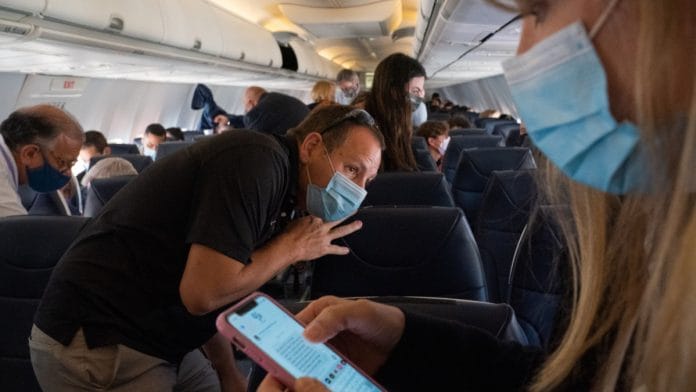So much for the travel mask mandate. After a federal judge in Florida on Monday struck down the rule promulgated last year by the Centers for Disease Control, the Biden administration and the airlines have raced to distance themselves from the much-criticized regulation. The opinion by Judge Kathryn Kimball Mizelle is worth a look, not least because of its implications for future pandemic policy.
The Times tells us that the mandate’s end has caused both “elation and dread”; observers have attacked the quality of the opinion as well as the qualifications of the author herself. I have my own difficulties with a part of Judge Mizell’s reasoning, but the outcome was foreordained after last summer’s U.S. Supreme Court opinion striking down the CDC’s eviction moratorium.
Let’s start there.
Last August, in Alabama Association of Realtors v. Department of Health and Human Services, the justices rejected the CDC’s claim that the Public Health Service Act granted the authority to restrict evictions of renters during the pandemic. The court held that the statute’s language, though broad, wasn’t as broad as the government argued. The CDC’s interpretation of the PHSA, the majority wrote, “strains credulity.”
Which leads us to the problem: The CDC justified its transportation mask mandate by citing exactly the same language.
Judge Mizelle quotes the Supreme Court majority to the effect that since enactment in 1944, the PHSA “has rarely been invoked” and has “generally been limited to quarantining infected individuals and prohibiting the import or sale of animals known to transmit disease.” Here, wrote the judge, the CDC went well beyond those limits.
Intuition might suggest that masking travelers, unlike regulating landlord tenant relations, is close to the Act’s core purpose, but Judge Mizelle, again following the Supreme Court’s example, closely parses the statutory language and finds no support for the CDC’s action.
From the statute’s lengthy grant of authority, the agency pointed particularly to its power to regulate “sanitation” in the interest of public health. To determine whether the agency was right, Judge Mizell set herself the task of figuring out what Congress meant. The wordsleuth in me appreciates Judge Mizelle’s trek through dictionaries of the 1940s, but this is also where I must offer a small dissent. The judge concludes that when the statute was passed, the word referred to cleaning, particularly of surfaces and objects.
Maybe so. But although Supreme Court justices love to quote from dictionaries, I prefer working out a word’s meaning at a given historical moment by studying popular usage of the time. Here, a wider search would have yielded a number of broader applications. One example: a Navy Department guide for sanitation officers published in 1949 defined “sanitation” as “the successful adjustment of the environment to the body so that disease is prevented and public health is promoted.” In short, the lexicographic picture is more complicated than the opinion suggests.
But perhaps I’m picking at nits. The mandate is over, for the same reason so many government policies are overturned. Any official action, even an action we like, must be authorized by law. Defending his seizure of the steel mills in 1951, President Harry Truman famously snapped, “The president has the power to keep the country from going to hell.” And as every law student knows, the Supreme Court emphatically disagreed. A crisis might evoke the determination to act, but only law tells us whether the power to act in a particular way actually exists.
Here, the court found no legal support. Like it or not, the mandate is over.
What will the effect be? That’s tricky. Let’s remember that the major airlines started requiring passengers to mask before the federal government required it. Originally they simply hoped to get people back aboard flights that were flying, even on a much-reduced schedule, at around 15% of capacity. Now that air travel is back in a big way, the question becomes whether the demise of the mandate will make a difference.
An April 2022 survey, conducted via Mechanical Turk, found that while 13.8% of respondents would pay to switch a reservation from an airline with a mask mandate to one without, a whopping 32.6% would pay to switch the other way around. If these preferences predict real-world behavior, a significant proportion of travelers will mask anyway.
I’m one of them. Should I board plane or train, I’ll surely mask up. The difference is, just as what I do is now up to me, what you do is now up to you. —Bloomberg
Also read: India risks power outages as high temperatures spike demand for coal






